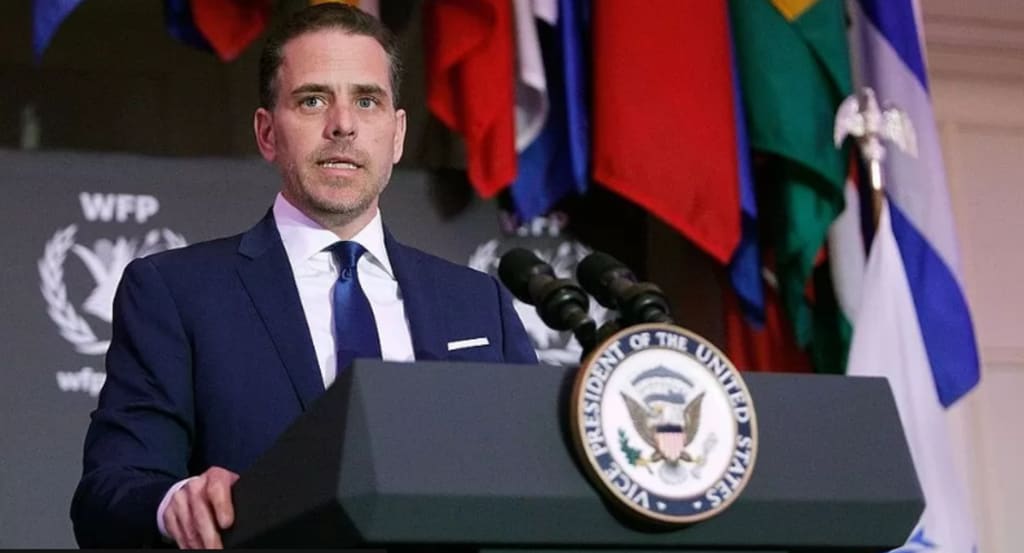Hunter Biden, Set to Plead Guilty to Tax Crimes and Acknowledge a Gun Offense
Son of President Biden faces legal consequences for tax evasion and firearm violation

Bustling city of Washington, D.C.,Hunter Biden. He is the son of Joe Biden, the 46th President of the United States. Hunter is known for his colorful life and his struggles with addiction, which often overshadowed his accomplishments. However, in the year 2023, Hunter found himself embroiled in a legal battle that would forever change the course of his life.
Hunter Biden, like many Americans, was required to pay his fair share of taxes to the Internal Revenue Service (IRS). However, as investigators dug deeper into his financial affairs, they uncovered a series of questionable transactions and inconsistencies. It was alleged that Hunter had failed to report substantial income from his various business dealings, including overseas ventures.
As the evidence against him mounted, the pressure on Hunter intensified. Realizing the gravity of the situation, he decided to confront his legal troubles head-on. In a shocking turn of events, Hunter announced his intention to plead guilty to tax crimes, acknowledging his failure to fulfill his obligations as a taxpayer.
The news of Hunter Biden's impending guilty plea reverberated throughout the country, attracting both critics and supporters. Some saw it as a long-overdue reckoning for a man who seemed to have evaded scrutiny due to his family name, while others viewed it as a politically motivated attack on the Biden family.
Amidst the tax crime charges, another revelation came to light. Hunter Biden was also set to acknowledge a gun offense. It was discovered that he had purchased a firearm but failed to disclose vital information on the required background check forms. This oversight, whether accidental or intentional, carried serious legal consequences.
The combination of tax crimes and the gun offense created a perfect storm of legal trouble for Hunter Biden. The media frenzy that followed was reminiscent of a high-stakes courtroom drama. People speculated about the potential impact on his father's presidency, with opponents seizing the opportunity to cast doubt on the integrity of the entire Biden administration.
Hunter, fully aware of the gravity of the situation, chose to take responsibility for his actions. He began working closely with his legal team, cooperating fully with investigators, and accepting the consequences of his mistakes. Hunter expressed remorse for his actions, admitting that he had let down his family, his father, and the American people.
As the legal proceedings unfolded, Hunter faced intense scrutiny and judgment from the public. Media outlets dissected his every move, past and present, often overshadowing his efforts to address his addiction and seek redemption. He found solace in his family and close friends, who offered unwavering support during this challenging time.
Eventually, the day of reckoning arrived. Hunter Biden appeared in court, ready to accept his fate. He pleaded guilty to the tax crimes, acknowledging the gravity of his financial transgressions. He also admitted his failure to provide accurate information during the gun purchase, accepting responsibility for the gun offense.
The judge, considering the circumstances and Hunter's willingness to cooperate, delivered a sentence that aimed to strike a balance between accountability and rehabilitation. Hunter was ordered to pay substantial fines and restitution to the IRS. Additionally, he was required to complete a strict probationary period, during which he would undergo counseling and submit to regular drug testing.
Hunter Biden emerged from the courtroom with a renewed sense of purpose. He knew that his actions would forever be a part of his story, but he was determined to move forward, making amends and rebuilding his life. Hunter recognized the opportunity for personal growth and committed himself to a path of sobriety, philanthropy, and advocacy.
Over time, Hunter dedicated himself to public service, using his experiences to raise awareness about addiction and the importance of mental health resources. He worked tirelessly to undo the damage caused by his past mistakes, seeking redemption through acts of Hunter Biden's redemption took various forms. He became an advocate for substance abuse treatment and mental health support, using his platform and personal experiences to shed light on the struggles faced by countless individuals battling addiction. Hunter openly shared his own journey, emphasizing the importance of empathy and compassion in addressing the root causes of substance abuse.
Hunter channeled his energy into philanthropic endeavors, supporting organizations that focused on addiction recovery, education, and access to healthcare. He partnered with existing initiatives and even established his own foundation, dedicated to assisting individuals and families affected by addiction. Through fundraising efforts and public speaking engagements, Hunter aimed to make a positive impact and provide resources for those in need.
As time passed, Hunter Biden's commitment to rebuilding his life extended beyond personal endeavors. He actively sought opportunities to work with lawmakers and policymakers to improve legislation surrounding mental health and addiction treatment. Hunter's insights and personal experiences became valuable assets in shaping policies that prioritized empathy, understanding, and effective support systems.
The public's perception of Hunter began to shift gradually as they witnessed his genuine efforts to make amends and contribute positively to society. While he still faced criticism and skepticism from some, many recognized the sincerity behind his actions and acknowledged that everyone deserved a chance at redemption.
Hunter's relationship with his father, President Joe Biden, was also a significant factor in his journey of redemption. The Biden family's unwavering support and love proved crucial in Hunter's recovery and ongoing efforts to rebuild his life. Their collective strength served as a reminder that familial bonds could endure even the toughest of challenges.
In the years that followed his guilty plea, Hunter Biden continued to learn, grow, and advocate for the causes he held dear. He became a voice for those who had been marginalized, using his platform to raise awareness about the intersectionality of addiction, mental health, and social justice. Hunter's story served as a reminder that mistakes did not define a person's entire life and that redemption and personal growth were always within reach.
While the legal chapter of Hunter's life may have concluded, the journey of self-improvement and making amends would be ongoing. Hunter understood that the consequences of his actions would continue to shape his future, but he remained committed to using his experiences to effect positive change.
Hunter Biden's story, marked by his guilty plea to tax crimes and acknowledgment of a gun offense, ultimately became one of resilience, redemption, and a determination to make a difference in the lives of others. It stood as a testament to the power of self-reflection, forgiveness, and the potential for personal growth, regardless of the mistakes one may have made in the past.
Hunter Biden's commitment to his own personal growth and advocacy work deepened. He became an influential voice in the realm of addiction and mental health, collaborating with experts, organizations, and policymakers to push for comprehensive reform in the healthcare system.
Hunter used his own experiences to highlight the flaws and gaps in addiction treatment and mental health services. He advocated for increased access to affordable and quality care, emphasizing the need for a compassionate and holistic approach to tackling these issues. Through public speaking engagements, interviews, and op-eds, Hunter spoke openly about the challenges he faced and the lessons he learned, inspiring others to seek help and supporting the eradication of the stigma associated with addiction.
Hunter's dedication to his advocacy work extended beyond addiction and mental health. He became involved in initiatives addressing criminal justice reform, recognizing the interconnectedness between substance abuse, mental health, and the justice system. Hunter worked alongside organizations striving to shift the focus from punishment to rehabilitation, emphasizing the importance of addressing the root causes of crime rather than perpetuating cycles of incarceration.
In addition to his advocacy efforts, Hunter found solace and fulfillment in his creative pursuits. He channeled his experiences and emotions into writing, releasing a memoir that chronicled his struggles, his path to recovery, and his journey towards redemption. The book resonated with many readers who found inspiration in his resilience and willingness to confront his own demons.
Despite the progress he had made, Hunter still faced challenges and setbacks. The road to redemption was not without its hurdles, and he acknowledged that healing was an ongoing process. However, Hunter remained steadfast in his commitment to personal growth and positively impacting the lives of others.
Hunter's story served as a reminder that everyone, regardless of their background or past mistakes, had the capacity for change and transformation. His journey of redemption became a source of hope for those facing their own battles, demonstrating that it was never too late to seek help, make amends, and create a better future.
Over time, Hunter's efforts and commitment to advocacy earned him respect and recognition from both supporters and critics alike. While his name and the controversies surrounding him had initially overshadowed his accomplishments, Hunter's tireless work in the realms of addiction, mental health, and criminal justice reform began to redefine his public image.
Hunter Biden's story was a testament to the power of personal growth, resilience, and the ability to find purpose in the face of adversity. He transformed his own struggles into a platform for change, leaving a lasting impact on the lives of those affected by addiction and mental health issues. Hunter's journey served as a reminder that even in the darkest moments, there was always the potential for redemption and the opportunity to create a meaningful and fulfilling life.
About the Creator
Anthony Gatimu
Being a writer,It requires constancy, discipline, and vulnerability.But inside that weakness lies your most noteworthy strength, for it is through your weakness that you interface with perusers on a significant level.






Comments
There are no comments for this story
Be the first to respond and start the conversation.